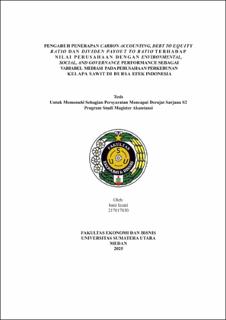Pengaruh Penerapan Carbon Accounting, Debt To Equity Ratio, dan Dividen Payout To Ratio terhadap Nilai Perusahaan Dengan Environmental, Social, and Governance Performance Sebagai Variabel Mediasi Pada Perusahaan Perkebunan Kelapa Sawit Di Bursa Efek Indonesia
The Effect of Carbon Accounting, Debt to Equity Ratio, and Dividend Payout to Ratio Implementation on Company Value with Environmental, Social, and Governance Performance as Mediating Variables in Palm Oil Plantation Companies Listed on the Indonesia Stock Exchange

Date
2025Author
Izzati, Ismi
Advisor(s)
Erwin, Keulana
Sadalia, Isfenti
Metadata
Show full item recordAbstract
This study aims to analyze the effect of Carbon Accounting, Debt to Equity Ratio
(DER), and Dividend Payout Ratio (DPR) on Firm Value with Environmental,
Social, and Governance (ESG) performance as a mediating variable. The research
focuses on palm oil plantation companies that meet the sustainability criteria
defined by the OJK Green Taxonomy. These criteria include the continuous
publication of sustainability reports from 2020 to 2024, implementation of carbon
accounting, possession of ISPO and RSPO certifications, and ESG scores from
global rating agencies such as Sustainalytics, SPOTT, or CSRHub. The sample
consists of five major companies selected using purposive sampling based on the
specified technical criteria.
The analytical method employed in this study is panel data regression and path
analysis to examine both direct and indirect relationships among the variables. The
results show that Carbon Accounting has a positive and significant effect on firm
value, indicating that companies that are more transparent in disclosing their
emissions tend to be more highly valued by the market. DPR also has a positive and
significant effect on firm value, whereas DER has a negative but statistically
insignificant effect. In the mediation model, ESG significantly mediates the
relationship between Carbon Accounting and firm value, but does not mediate the
effects of DER and DPR.
These findings highlight the importance of integrating sustainability aspects into
corporate strategy, not only to comply with regulations but also to add financial
value. ESG and carbon accounting are shown to function not only as compliance
indicators but also as drivers of enhancedfirm value.
Collections
- Master Theses [1395]
